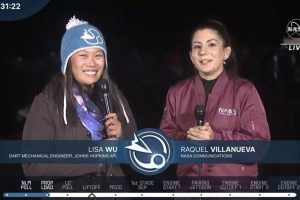
Wu’s career as a spacecraft mechanical engineer, most notably her contribution to the NASA Double Asteroid Redirection Test (DART) mission, combines many of her interests. “Whether it’s building the tallest roller coaster out of Legos, putting together an IKEA bookshelf, or fixing a broken toy, I have always found hands-on projects to be fun and rewarding,” Wu says. This passion, along with her fascination for space discovery, led her to join Johns Hopkins University’s Applied Physics Laboratory and to pursue a master’s in mechanical engineering through the Whiting School’s Engineering for Professionals programs.
The DART spacecraft, launched in 2021 and successfully impacted in 2022, was a NASA space mission aimed at testing a method of planetary defense against near-Earth objects. The concept behind DART is that a spacecraft can deflect a threatening asteroid through calculated kinetic impact by colliding with an asteroid, redirecting its trajectory away from the Earth.
As DART’s deputy mechanical engineer, Wu explains she was responsible for, “leading and coordinating operations in building the spacecraft, using fast-pace problem solving skills to meet our launch date, and in general, overseeing various mechanical systems from start to finish.” While many of the skills she employed during the mission were learned on the job, she says earning her master’s degree also helped prepare her for her role, explaining that, “The courses from the degree helped accelerate my knowledge of mechanical systems, which in turn accelerated my professional career.”
Her involvement in the DART mission directly overlapped with her time as a graduate student. In the EP program, she was able to balance her many responsibilities. “The flexibility of online classes meant that I could watch lectures and complete assignments on my own schedule. This was especially helpful during work travel—I could literally be anywhere in any time zone and continue to work toward my degree!”